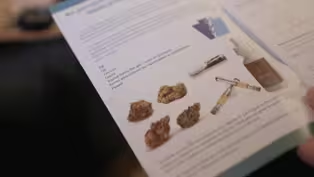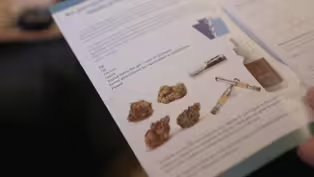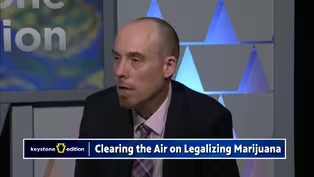Keystone Edition
Risks, Roadblocks & Research
Clip: 4/7/2025 | 11m 30sVideo has Closed Captions
Experts and lawmakers debate cannabis safety, science, and legalization in PA.
As PA weighs legalizing recreational cannabis, lawmakers and scientists explore public safety, unregulated THC risks, youth mental health, and enforcement challenges. With concerns over funding, regulation, and medical misuse, Wilkes University researchers stress the need for accurate data, research access, and public education on this evolving issue.
Problems playing video? | Closed Captioning Feedback
Problems playing video? | Closed Captioning Feedback
Keystone Edition is a local public television program presented by WVIA
Keystone Edition
Risks, Roadblocks & Research
Clip: 4/7/2025 | 11m 30sVideo has Closed Captions
As PA weighs legalizing recreational cannabis, lawmakers and scientists explore public safety, unregulated THC risks, youth mental health, and enforcement challenges. With concerns over funding, regulation, and medical misuse, Wilkes University researchers stress the need for accurate data, research access, and public education on this evolving issue.
Problems playing video? | Closed Captioning Feedback
How to Watch Keystone Edition
Keystone Edition is available to stream on pbs.org and the free PBS App, available on iPhone, Apple TV, Android TV, Android smartphones, Amazon Fire TV, Amazon Fire Tablet, Roku, Samsung Smart TV, and Vizio.
Providing Support for PBS.org
Learn Moreabout PBS online sponsorship(logo whooshing) - So I think we should start with what is happening in Harrisburg, if you don't mind, Senator, can you give us just an update about where that legislation stands right now?
- Sure, well, I think there's still a long way to go as far as getting recreational legalized.
And so that's the concern in Harrisburg when you look at a state budget that's due June 30th and having this not even on the docket and having the votes there to legalize recreational marijuana and counting those dollars in this year's budget and next year's budget.
So that's the concern.
I don't think the votes are there yet for this to happen on both chambers.
And so I think we're a little ways away this going forward.
- It seems unlikely to you at this point.
- [Rosemary] Yes, it does.
- So you heard the governor say $1.3 billion and Pennsylvanians are going elsewhere.
We've heard that argument.
What are some of the arguments that are sort of tripping this up a little bit right now?
If the money isn't gonna be what you're going for?
- Yeah, so you gotta be careful that money doesn't lead you just to every decision.
And I think the states that have legalized it, the first one to do it, I believe was Colorado.
And that governor at the time said, watch us and see what happens.
And we have seen what has happened in Colorado.
We have seen the issues as far as law enforcement, human services, addiction programs.
There's actually statistics that state that for every dollar that's made in revenue, there's $4 and 50 cents spent in other services that are needed to make up for the fact of what it's causing in society.
So I think that really is a strong concern.
And you'll see that in New Jersey and you'll see that in New York.
You'll see law enforcement issues with the ability with drugged driving, the inability to recognize if somebody's under the influence.
You will see the conversation about the youth mind.
And this is, you know, cannabis and THC that is not like in the '70s.
This is very strong, and I'm sure we'll talk about that further with other guests, but there's a lot of different conversation of the impacts on society and the $1.3 billion that is being proposed is not really a number that is fully accurate because it doesn't take into account some of the issues that we're gonna deal with once it is legalized - Having to spend after the fact.
- [Rosemary] Exactly.
- Okay, Well you kind of teed that up to Dr. VanWert then.
Is it true that THC, CBD, we're not talking about the same thing now that we were back in the '60s or '70s?
- Absolutely, I mean, sometimes you'll get 20 to 20% or higher in fact, and that would be the actual THC content on a weight basis.
So that's quite a bit.
So 20%, 30%, sometimes even more.
And, you know, also in some of the shops that you can go to, you can get almost 100% of the unregulated Delta 8 THC, which is a little less potent, but it works the same way, it binds to the same receptors in the brain and causes the same effects.
So that, it's a whole different ballgame.
I mean, Delta 8 THC was probably not even able to be acquired probably just 10 years ago or 20 years ago because the way they synthesize it, the mechanism for synthesizing it, probably wasn't well known at that point in time, but now it's abundant and it's not regulated.
- We talked about how, let's say 20, 20 some years ago, people learning pharmacy in college weren't learning a lot of this.
Of course I have no firsthand knowledge of that, but now it seems as though you're teaching toxicology, pharmacology and now you have to worry about a hemp plant.
I guess my point is, can you start from the very beginning and kind of tell us exactly what this is and exactly why Wilkes felt the need to bring it into their curriculum?
- I think the main focus for Wilkes, at least I know for me and a lot of my colleagues is, about getting to the truth.
And we wanted to know, I mean, actually I'm passionate about finding out what is actually in these products and, you know, the safety side of it.
So I've been testing, you know, we won't talk about where, but local businesses, vape shops, you know, testing their products to see if you know what's on the label is accurate.
And sometimes, well, in one instance we found 5% THC, which doesn't sound like a lot, but the legal limit is 0.3% federally, 0.3.
And we found 5%.
So it's the safety part of it.
And not only that, we found that much THC, but then other, what they call cannabinoids, or the major constituents that are all related to THC, we found many other ones in there that, you know, either weren't on the labels or there were no labels to begin with.
And that's the big part of it is training, you know, educating, not just pharmacy students, but we have the certificate program and a bachelor's degree program in chemistry that could be, you know, pharmacy students can get involved in that or people that are already out there in their careers that want to further their education and get a certificate, for example.
- Go ahead, Isabel, what were you gonna say?
- Yeah, Dr. VanWert, you said the other day, we were speaking over the phone, that with some of the products that you can purchase at smoke shops since, you know, that isn't properly labeled as you put it, that people, you know, might not be understanding what they're putting into their body and can cause them some negative health effects.
You talked about the chance of having an anxiety attack potentially because of this.
I - I don't think that's discussed enough, but one of the major side effects of too much of THC, whether it's the standard, what's called Delta 9, right, that's your standard THC that is in most products or used to be in most of the, you know, smoking products, but then this other THC, which is not regulated, which is almost identical chemically, that if you don't know how much you're getting, even if there's a label, you don't know if it's accurate.
I certainly don't wanna underestimate the importance of the effect on mental health.
You know, our society right now is having a major, I would say major issue with mental health and anxiety, social anxiety disorder.
And you might say, that's not physical, that's mental.
Everything that happens in your brain is physical when it comes down to it.
- But you're talking about causing anxiety with the substance that is often known as something to help calm anxiety, correct?
- Correct, correct.
So there are, you know, there are different strains, they would call them, of, you know, marijuana that have certain, what they call terpenes, or there are other chemicals in marijuana, and there are, you know, hundreds of them.
Chemically it's very different in appearance, which I won't get into, but some of those terpenes cause a heightened energy and maybe anxiety and some of them actually can cause sedation.
So if you knew exactly what you were getting, maybe you could choose one, if you did have an anxiety disorder, to maybe lower that if you knew what was in it.
And the reality is even these things called terpenes, which are in a lot of other things, they're in flowers and they're just a lot of the scents that we get, like orange oil and stuff like that.
There's a lot of it in cannabis as well.
But we don't, no matter what anyone says out there, I mean, this whole idea of an entourage effect where if you combine multiple terpenes with THC that you'll get a better feeling.
The problem is, we don't know almost any, very, very little to nothing about what receptors in the body these terpenes are binding to and how they interact with our physiology.
- What would be helpful to figure that out and, you know, understand better how our bodies are affected?
You know, regardless if it is legalized, but just making sure that people are safe.
- Well, certainly, I mean, what would help is certainly funding in that area of research.
Now anyone can study terpenes without, because most of them, if not all of them, are not regulated federal because they don't really create a high, they're not psychogenic.
So things, like I said, to be in lemon oil, but some of those would also be in THC, or not in THC, in cannabis and things like that.
And some of the things you find in black pepper, one of those, that smell is a terpene that's also in cannabis.
So anyone could study that, It's just they would need the funding to get the personnel and the equipment and the supplies.
- Senator, part of what you said early on was the enforcing, I think you actually said the word breathalyzer, which kind of got me thinking, is there a way to test for, is there a way for anyone to test how high you are, how much you have, the levels you have in your system?
- I believe something is being worked on on that type of mechanism, but at this point there's not a true accurate way to say you are, within a couple hours have, you know, taken a THC or if it's been in the body for a month or whatever it would be.
So the accuracy of that is very difficult for law enforcement to find out and to hold that to, you know, a docket there for a court case or something of that nature.
I think one of the largest pieces of the whole impact is also on the youth and on the fact of medical marijuana versus recreational.
So if you look at, I was a big fan of it becoming medical marijuana, I felt it was strong that if you had the ability for it to work for you, maybe one drug didn't work for you, but it would work for someone else, to have that option.
And I think we now have problems with our medical marijuana program as well.
There's three doctors in the state of Pennsylvania that are prescribing 11,000 prescriptions.
That's 30 a day if they work 365 days a year.
And we don't know what kind of specialty they are.
Is that a pediatric doctor prescribing to young patients that we still don't know the effects on this medicine to the brain, to the receptors, to everything else.
So that research is really important.
So within that medical program we have problems, let alone if we were to expand this and open this up to a full recreational.
And when you look at the impacts, again, enforcement is one of them.
The other piece is the pricing when you regulate is going to go up and people are still going to go to the illegal market.
So some of the estimates with the revenue are really not accurate because buyers will go to a less expensive source.
But I think the impacts are broad, the numbers are broad around the board, and I think the public has to realize on a federal level it is still a Schedule 1 drug controlled substance.
And that hasn't moved.
So we're still looking at creating a recreational product for something that's a controlled substance and a Schedule 1 at the federal level.
Clearing the Air on Legalizing Marijuana - Preview
Preview: 4/7/2025 | 30s | Watch Monday, April 7th at 7pm on WVIA TV (30s)
The Push to Legalize Cannabis in Pennsylvania
Clip: 4/7/2025 | 3m 19s | Cannabis legalization sparks debate over health, safety, and state revenue. (3m 19s)
Science, Safety, and Society: The Future of Cannabis Education and Legalization
Clip: 4/7/2025 | 10m 14s | A look into cannabis education, career paths, legalization concerns, and public health implications. (10m 14s)
Providing Support for PBS.org
Learn Moreabout PBS online sponsorship
- News and Public Affairs

Top journalists deliver compelling original analysis of the hour's headlines.

- News and Public Affairs

FRONTLINE is investigative journalism that questions, explains and changes our world.












Support for PBS provided by:
Keystone Edition is a local public television program presented by WVIA


